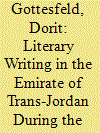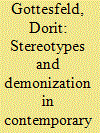| Srl | Item |
| 1 |
ID:
188649


|
|
|
|
|
| Summary/Abstract |
This article deals with the literature that flourished in Jordan during the reign of King Abdullah I. It shows that although Abdullah wanted his views and the values of his regime to prevail over literary writing, behind the scenes, an opposition literature grew that undermined these values. Oppositional messages were disguised using various artistic means and many works were published outside rather than inside Jordan. In the end, however, it seems that the regime still managed to impose its values, since up to the present, literary research has tended to ignore the works written during this early period, showing that writing in Trans-Jordan was not oppositional. This article fills this void by pointing to the buds of subversion as reflected in literature written at that time.
|
|
|
|
|
|
|
|
|
|
|
|
|
|
|
|
| 2 |
ID:
178539


|
|
|
|
|
| Summary/Abstract |
This article examines the way in which the Israeli-Palestinian conflict, Israel and the Israelis are reflected in contemporary Palestinian writing in Jordan, taking the work of Nablus-born Jordanian author Samia ʿAtʿut as a case study. The article shows how, on the one hand, ʿAtʿut uses literary writing as a tool to reflect the mood of the people in relation to the Palestinian issue. On the other hand, through writing full of obscurity, sophistry and deception, and by the incorporation of political-national texts within collections of stories dealing mainly with social issues, ʿAtʿut manages to prevent her writing from being perceived as ideological, and transforms her work into texts that carry a deep and universal social message. The article shows that the Israel-Jordan peace agreement, the Jordanian establishment’s changing attitudes toward Israel, the contemporary trends of ‘personal’ literary writing, and the attempt to understand the ‘other’ that exists in the literary works of other contemporary female writers – all fail to overcome the writer’s abrasive opinions, which she expresses in seemingly ideological writing.
|
|
|
|
|
|
|
|
|
|
|
|
|
|
|
|